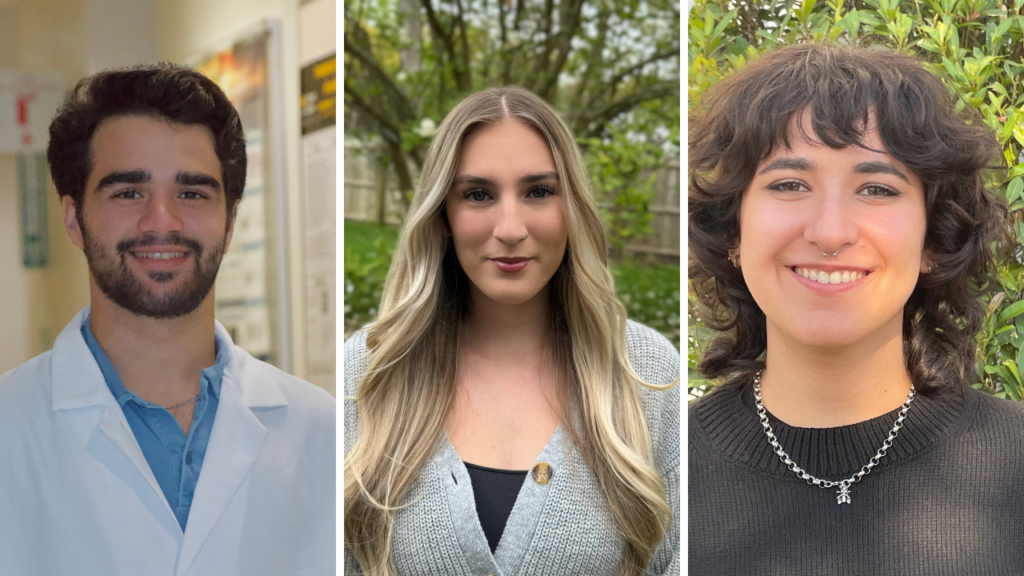Three UCF undergraduates will spend their summer doing cutting-edge Huntington disease (HD) research after earning prestigious fellowships from the Huntington’s Disease Society of America.

The society awarded six national fellowships this year and UCF received half of them.
The students work in the research lab of Dr. Amber Southwell, a College of Medicine HD expert, who also helps run an interdisciplinary clinic for patients with the inherited disease.
HD causes brain cells to break down and die, causing patients to suffer involuntary movements, difficulty swallowing, cognitive decline, and behavioral and emotional control issues. Symptoms usually begin at the height of adulthood – ages 30 to 50. There is no cure or drug treatment that can slow down the disease although scientific studies show that an interdisciplinary clinical program like UCF’s can delay disease progression and improve quality of life for patients and their families.
UCF student scientists Alex De Almeida, Kaleigh Hanley and Sabrina “Shai” Lipkin will research a variety of HD topics, including the biological causes of aggression, depression, and OCD-like symptoms that impact Huntington patients and their families.
Such research by undergraduates is an important part of their scientific career path, Dr. Southwell said, noting that the three have dreams of becoming physicians, academic researchers and M.D./Ph.D.’s. “UCF has very strong undergraduate programs that enroll excellent students,” she said. “The caliber of these students and their desire to do research is extraordinary. I am so proud of them.”
To compete for the fellowship, the students had to develop a research hypothesis, conduct initial research to design ways to test their hypothesis, and have a scientific plan for future studies. “They had to show a passion for research and that their hypotheses have a strong rationale,” their mentor said. “Their studies have the potential of impacting the lives of patients with Huntington disease, their families and their caregivers.”
The psychological impact of HD is understudied, she said, because it is so difficult to accurately measure and because HD causes unique behavioral symptoms in every patient. One of the most challenging symptoms for patients and their families is aggression, where a formerly mild-mannered person may suddenly face arrest for assault or road rage as the disease progresses.
De Almeida said he wants to research aggression in HD patients because of the stigma they face. As a first-generation American, he said he has seen prejudice and labeling from others. “I know that inside every person that is living with Huntington disease is the desire to be loved just like the rest of us,” he said. “Research into Huntington disease has opened my eyes to the reality that making this world a better place is a constant battle.”
Lipkin also has a personal reason behind her interested in HD research. “As someone who has witnessed my family being plagued by dementia and Alzheimer’s, I have always harbored a personal vendetta against neurodegenerative diseases,” she said. That passion led her to learn about neurodegenerative diseases to help her care for family members. She said working in Dr. Southwell’s lab and doing outreach with HD patients have inspired her to do translational research that will help improve the quality of life for patients and their families.
Hanley serves as a patient navigator at UCF’s Huntington disease clinic. “This experience has given my research a sensitive and humanizing touch. I work closely with patients and their families, observing firsthand the life-altering effects of Huntington disease. The severity and abundance of symptoms of individuals affected by Huntington disease compared to other forms of neurodegenerative disease is striking and has increased my desire to contribute to their care,” she said.
UCF’s clinic and its sister site at the AdventHealth Neuroscience Institute is a partner sites to the Huntington’s Disease Society of American Center of Excellence at the University of South Florida. Located inside the UCF College of Health Professions and Sciences Rehabilitation Innovation Center in Research Park, the clinic integrates neurologists, psychologists, speech language pathologists, physical therapists, social workers and researchers to provide comprehensive care to patients and their caregivers, and to help answer important questions that will advance the field of care. The clinic is located at 3280 Progress Drive, suite 500.
To learn more about the clinic, or to make an appointment, visit the HDSA Center of Excellence website or email chd@ucf.edu.